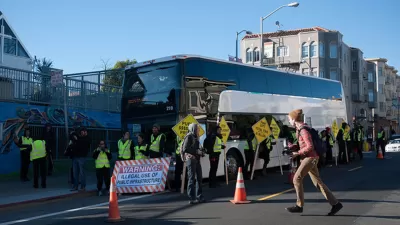In San Francisco at this time last year, Google bus protestors and Ellis Act rage were making the news everyday. The City seems a little more...adjusted these days.
"San Francisco’s antitech movement, it appears, has fizzled before it ever really took off," according to an article by Kristen V. Brown.
Brown cites a source from inside the protest movement to deliver a postmortem:
"'As it turned out, after the media had digested our actions, there was no groundswell of support from young people or everyday residents of San Francisco,' said a representative of the Counterforce, an anonymous collective and one of the Bay Area's most theatrical tech protest groups. 'By the middle of 2014, it was clear that only the same small groups would keep acting against the tech industry, and gradually the momentum was halted.'"
The anti-tech movement focused some of its ire toward planning related policy issues, such as Ellis Act evictions and the use of private, chartered buses at public transit stops. Brown notes that major policy initiatives supported by protest groups have, in large part, failed. For instance, "Proposition G, a ballot measure intended to curb real estate speculation that drives up housing costs, and an Assembly bid by Supervisor David Campos, probably the movement’s greatest political ally, both failed at the polls in November." There is also the poll announced earlier this month by the Office of Mayor Ed Lee finding widespread support for the tech industry among San Francisco residents.
FULL STORY: Is the antitech movement obsolete?

Planetizen Federal Action Tracker
A weekly monitor of how Trump’s orders and actions are impacting planners and planning in America.

Congressman Proposes Bill to Rename DC Metro “Trump Train”
The Make Autorail Great Again Act would withhold federal funding to the system until the Washington Metropolitan Area Transit Authority (WMATA), rebrands as the Washington Metropolitan Authority for Greater Access (WMAGA).

The Simple Legislative Tool Transforming Vacant Downtowns
In California, Michigan and Georgia, an easy win is bringing dollars — and delight — back to city centers.

The States Losing Rural Delivery Rooms at an Alarming Pace
In some states, as few as 9% of rural hospitals still deliver babies. As a result, rising pre-term births, no adequate pre-term care and "harrowing" close calls are a growing reality.

The Small South Asian Republic Going all in on EVs
Thanks to one simple policy change less than five years ago, 65% of new cars in this Himalayan country are now electric.

DC Backpedals on Bike Lane Protection, Swaps Barriers for Paint
Citing aesthetic concerns, the city is removing the concrete barriers and flexposts that once separated Arizona Avenue cyclists from motor vehicles.
Urban Design for Planners 1: Software Tools
This six-course series explores essential urban design concepts using open source software and equips planners with the tools they need to participate fully in the urban design process.
Planning for Universal Design
Learn the tools for implementing Universal Design in planning regulations.
Smith Gee Studio
City of Charlotte
City of Camden Redevelopment Agency
City of Astoria
Transportation Research & Education Center (TREC) at Portland State University
US High Speed Rail Association
City of Camden Redevelopment Agency
Municipality of Princeton (NJ)




























